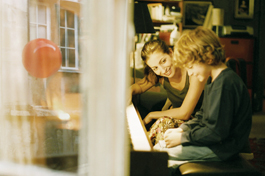home | metro silicon valley index | movies | current reviews | film review

Tsai Cheng-tai
Window Watchers: Simon Iteanu practices his piano lessons in 'Flight of the Red Balloon.'
Buoyancy
Hou Hsiao Hsien's 'Flight of the Red Balloon' remakesthe famous short French film
By Richard von Busack
ABOUT FIFTY YEARS ago, Albert Lamorisse made the quintessential film about Paris, an all-ages short film titled The Red Balloon. Last winter, it was given a blink-and-you'll-miss it rerelease in San Francisco, double-billed with Lamorisse's White Mane. There was no reason why you should have heard of this double bill. It was promoted with one-thousandth of a percentage point of the ad budget of Prince Caspian. Now available on DVD, the famous short is one of those rare movies that can be loved by everyone in a family, a parable of loss and redemption set in a soulfully grungy 1956 Paris.
Hou Hsiao Hsien's Flight of the Red Balloon is a self-declared "free adaptation" of The Red Balloon. How can you dazzle a child of 2008 with the magic of a balloon with a mind of its own? The illusion of a balloon following a little boy through the streets would be elementary work for a digital animator. Moreover, the effect has been used and reused—one example recently: the flying umbrella careening over the skyline of New York in The Nanny Diaries.
In short, The Red Balloon is not an easy film for a director to paraphrase, but Hou has done it as few could. Hou gives us the simple graphic appeal of a red orb floating over the spires and mansard roofs. But this time, the hovering balloon is less of a chum and more of a sentinel or a mysterious spirit. As in the first go-round, you're left with the question of whether an unleashed balloon is free, or lost. The same question goes for the 7-year-old boy Simon (Simon Iteanu), who is becoming as unmoored as the balloon of the title.
Hou focuses on the life of a fractured family in Paris. A single mother and artist named Suzanne (Juliette Binoche) hires a part-time baby sitter, a Chinese film student named Song (Song Fang). Song has keys to the apartment and runs errands for the woman, but the relationship is tension-ridden. Patches of cultural friction break out between them, illustrating the differences in the way Chinese and Europeans deal with money, and with bosses and workers. Like us, Song is a foreigner in this world. Watching through her eyes, you know a few hundred things about Suzanne and Simon, even without too much dialogue or exposition.
Binoche is dyed blonde and dressed a little young for her age. Few roles scare an actress as much as the role of a distracted mother. But Binoche embraces Suzanne and makes us care for her, just by showing the force and concentration this character has as an artist. She's a voice actor for a puppet troupe, rehearsing for an upcoming show. Hou seems to like her tough spirit, her untidiness, the way she slurps water out of the kitchen faucet at the end of one humid day.
Simon's father flew the coop (to Montreal, it turns out) leaving Suzanne in charge of this cubbyhole of an attic apartment, with its loft bedroom up a set of steep rickety stairs. This single mother is at war with her over-familiar downstairs tenants, who not only let themselves into her place but are careless about paying the rent.
Visually speaking, the characters are held at arms' length. Hou prefers to observe them in reflections or through panes of glass. The boy Simon doesn't give us everything of himself; he's hidden in his shaggy hair or in silences. His great moment of communion is with his own reflection. He daydreams, plays a little pinball and has enough time to notice the phenomenon of a balloon that follows him or peers into his house.
One fine shot of a triste, cirrusy afternoon, with a brooding sun doubled in the glass of a train window, is painterly, yet there's no fussiness to it. The scenes of Paris contain nothing we've really seen before. Hou pauses to note an old marble marker for an ancient puppet theater, half-melted by acid rain. He pauses under the swaying hooves of a merry-go-round; mounted, the children lance for the brass ring with little batons that come straight for the camera's eye. And every passing flare of summer light makes Suzanne glow.
The intelligence and detachment of this filmmaker really shines in one episode, a conversation with a pair of piano movers. Suzanne compliments them on how well they estimated the clearance of a doorway: "Your eyes are like calculators." "It's what we're paid for," says one of the movers, parrying the compliment. Dropping his guard a little, he tells the story, briefly, about the ways he's been hurt on the job.
As a stranger in Paris, Hou cherishes those interactions that don't have deep meaning and yet seem to illustrate the soul of a city. Watching Hou's lack of emphasis on the importance of any single defining event is like being freed at last from the dungeon of Syd Field.
![]() FLIGHT OF THE RED BALLOON (Unrated; 113 min.), directed by Hou Hsiao Hsien, written by Hou and François Margolin, photographed by Lee Pin Bing and starring Juliette Binoche, Simon Iteanu and Song Fang, opens May 16 at selected theaters.
FLIGHT OF THE RED BALLOON (Unrated; 113 min.), directed by Hou Hsiao Hsien, written by Hou and François Margolin, photographed by Lee Pin Bing and starring Juliette Binoche, Simon Iteanu and Song Fang, opens May 16 at selected theaters.
Send a letter to the editor about this story.
|
|
|
|
|
|